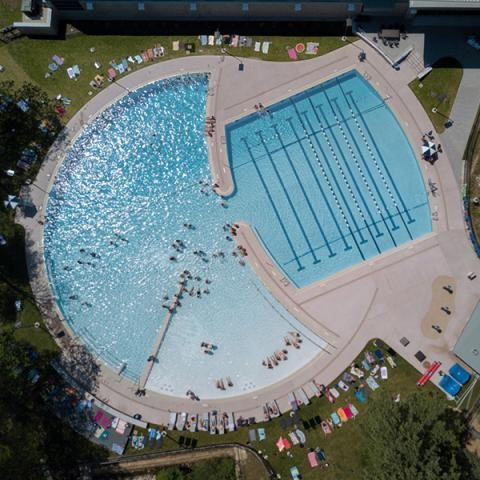The information contained in this article is not intended as legal advice and may no longer be accurate due to changes in the law. Consult NHMA's legal services or your municipal attorney.
The New Hampshire Department of Environmental Services is reminding owners and operators of public bathing facilities (PBFs), including cities and towns, they are required by New Hampshire law to register all existing and new public pools or spas with the state, conduct an annual fee-based self-certification of each existing facility and certify that the PBF is operated under the supervision of a certified pool operator.
The New Hampshire Department of Environmental Services (NHDES) Public Pool and Spa Program uses the information provided in the mandatory registration to establish a database of PBFs, documenting contact information, basic physical specifications and circulation system details for each facility. An online registration form is now available on our PBF Registration Form webpage.
The annual self-certification fee is $250 per PBF (regardless of size) up to a maximum of $1,500 annually for any facility that has more than six PBFs. It includes an annual compliance declaration that focuses on the practical aspects of public pool and spa operation such as: circulation, filter and disinfection system performance, daily water quality testing and recordkeeping, presence of critical life-safety equipment, and facility maintenance. For seasonal facilities, the annual self-certification must be completed annually prior to reopening. The online form and payment instructions are available on the PBF annual Self-Certification Form webpage.

All PBFs must operate under the supervision of a certified pool operator (CPO). A CPO may be the owner or designee, an employee of the establishment where the PBF is located, or a contracted vendor. The CPO is responsible for training on-site personnel in the basics of daily operation, including but not limited to, water testing and record keeping, documenting operational issues, maintaining water quality/clarity, handling sanitizers and pool closure procedures. The CPO must personally visit the PBF at least once a week to ensure the pool is being operated in a safe and sanitary manner, and the CPO must be available by telephone to on-site personnel whenever not personally present. Certifications can be obtained from an approved training program dedicated to the operation of PBFs. To find an in-person or virtual training course offering in New Hampshire, visit the Pool and Hot Tub Alliance webpage.
Operation of a public bathing facility by an owner/operator that has not met the three requirements outlined above (registration, self-certification, and operation under supervision of a CPA) is a violation of state law. NHDES has initiated an outreach campaign to the owners and operators of public bathing facilities to educate them on the applicable laws and assist them with coming into compliance for 2023. NHDES encourages public bathing facility owners and operators to complete this process as soon as possible. The NHDES Public Pool and Spa program will be completing inspections throughout the summer and fall and will be confirming compliance with the requirements outlined above at the time of inspection. To learn more about the program, please visit the NHDES Public Bathing Facility Program webpage.
State regulations and codes are developed to make sure that treated recreational water facilities (for example, pools, hot tubs and water parks) provide a clean, healthy and safe environment for the public. These regulations set minimum standards to decrease the public’s risk of illness and injury. Industries and organizations that should take notice of these requirements include, but are not limited to, campgrounds, colleges, condominium associations, fitness centers, hotels, motels and municipalities. Private residential pools are exempt.
For more information about these requirements, please contact, Tim Wilson, NHDES Public Pool and Spa Program Manager, at (603) 271-7108 or DESpools@des.nh.gov.